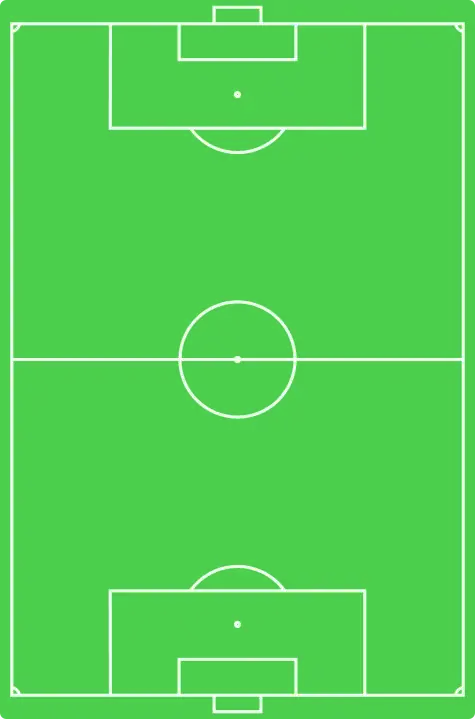Deportivo Toluca F.C.
Deportivo Toluca Fútbol Club S.A. de C.V. (Spanish pronunciation: [depoɾˈtiβo toˈluka ˈfutβol ˈkluβ]), commonly known as Deportivo Toluca or just Toluca, is a Mexican football club, playing in the Liga MX, the top-flight of Mexican football. Toluca's stadium, Estadio Nemesio Díez is located in Toluca, State of Mexico in Mexico. The team was founded in 1917.
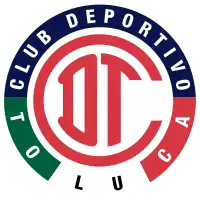 | ||||
| Full name | Deportivo Toluca Fútbol Club S.A. de C.V. | |||
|---|---|---|---|---|
| Nickname(s) | Los Diablos Rojos (The Red Devils) Los Escarlatas (The Scarlets) | |||
| Founded | 12 February 1917 | |||
| Ground | Estadio Nemesio Díez Toluca, Mexico, Mexico | |||
| Capacity | 30,000[1] | |||
| Owner | Valentín Díez | |||
| Chairman | Francisco Suinaga | |||
| Manager | Hernán Cristante | |||
| League | Liga MX | |||
| Guardianes 2020 | 11th (Reclassification) | |||
| Website | Club website | |||
|
| ||||
Toluca has won the Mexican Primera División 10 times, making it the third most winning team, behind América (13) and Guadalajara (12). Besides this, the team has also won two domestic cups and two CONCACAF Champions' Cup.
According to a 2018 poll, Toluca is the eighth most popular team in Mexico.[2]
History
Early years
On 12 February 1917, the brothers Román Alday and Gerardo Ferrat alongside Filiberto Navas and Manuel Henkel created Deportivo Toluca Futbol Club. In 1950, the team joined the recently formed Segunda División de México advancing to Mexican Primera División in 1953 by having tied with Irapuato by three goals, two by Rubén Pichardo and one by that tournament's goal scorer Mateo de la Tijera having left one more match to play.
The Teams first official First Division game was against Atlante, in which Toluca won 2 goals by one
The team won two consecutive championships in 1966 and 1967 under coach Ignacio Trelles. In 1975 Toluca won the championship one more time. Coached by Uruguayan Ricardo de León, Toluca played a style of game that was consistently criticized as ultra-defensive but won the championship by defeating León in the final-four mini-tournament 1–0, with the lone goal being scored by Ecuadorian Ítalo Estupiñan. This is the only time the Mexican Championship has been decided by a round-robin, two-legged, mini-tournament.
Enrique Meza era
In 1997 Enrique "Ojitos" Meza became the coach of the team, after reaching the finals of the Mexican league with Toros Neza. Toluca resurged, its tactical scheme was very offensive, which was very characteristic of its coach. It was not atypical to see scores like 5–3. The offensive idea suited perfectly the Paraguayan José Saturnino Cardozo, who became the best scorer of the league in four occasions.
On his second tournament with the team, Meza led Toluca to win the championship in the Verano 1998 tournament, the first one in twenty years. Finishing the regular season as leader of the tournament with 33 points, Toluca went on to beat Atlante and América in the quarterfinals and semifinals respectively. Toluca then faced Necaxa at the final.
After losing with the Hidrorrayos in the first leg of the final 1–2 at the Estadio Azteca, Necaxa scored two goals in the first two minutes of the second leg match at the Estadio Nemesio Díez, losing 1–4 at the aggregate score. Toluca then scored five goals with no answer from Necaxa, Taboada at 3', Abundis at 35' and 52', and Cardozo at 58' and 89'.[3] Toluca won the final with a 6–3 aggregate score, winning its fourth title and the first seven titles in the short tournaments era.
For the Invierno 1998, Toluca finished second in the regular season behind Cruz Azul, but was eliminated in the Liguilla's first round, losing 2–3 in the aggregate score against Atlas, seeded 7th.
The next tournament, Verano 1999, Toluca finished as leader of the tournament again with a record of 12 wins, 3 draws and losing only 2 matches, against Santos Laguna and Atlas. The team defeated Necaxa and Santos Laguna in the quarterfinals and semifinals, respectively. Toluca went on to play the final against Atlas, second best team of the regular season.
After two thrilling matches, a 3–3 draw on the first leg at Estadio Jalisco and a 2–2 tie on the second leg at the Estadio Nemesio Díez, the championship was defined in penalties; Toluca won 5–4.
With Enrique Meza as coach, Toluca won the championship three times in a period of three years. Meza left the team in October 2000 to manage Mexico national football team.
Golden era in short tournaments
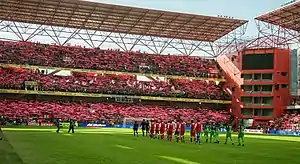
In the Invierno 2001 tournament Ricardo La Volpe became the coach of Toluca. He, along with Cardozo and Vicente Sánchez had one of the most successful and exciting teams in years. However, La Volpe left Toluca with a few weeks left in the season, but without him, they still won their 7th title.
At the end of the Apertura 2005 tournament, the team became champions again, beating Monterrey by an aggregate of 6–3, after the questionable decisions of Mexican referee Marco Rodriguez "El Chiquidracula", who expelled three players from Monterrey on their first foul committed.
In Apertura 2006, they tied in the first leg (1-1) but suffered a loss in the Estadio Nemesio Díez (2-1) against Guadalajara.
In the Clausura 2007 tournament, Toluca had one of their worst seasons, finishing in last place. In the Copa Libertadores 2007, they made it to the round of 16, where they were subsequently eliminated by Cúcuta Deportivo from Colombia. Following the elimination from both tournaments, Gallego resigned from his position stating the need for a year off as his reason for resigning from Club Toluca. José Pekerman, former coach of the Argentine national team, was appointed as head coach of Club Toluca on May 30, 2007.[4]
Club Toluca failed to qualify for the 2008 Copa Libertadores. On the Apertura 2008, Toluca had a weak start under their new coach, Jose Manuel "El Chepo" De La Torre, on one point going on a four-game streak of only draws. On the last five games of the regular season, they reversed the tying streak, making 13 points out of a possible 15, ending the regular season in 2nd place overall with 27 points and thus advancing to the playoffs. Their goalkeeper Hernan Cristante set a record by not allowing any goals for 773 minutes.
Toluca would go on to win the Bicentenario 2010 tournament by beating Santos Laguna in a dramatic penalty shoot-out, earning them the tenth cup win, the same amount as Club América. Besides winning the domestic title ten times, Toluca has also been the Runner-Up of the Mexican domestic tournament six times. On the Apertura 2012, Toluca finished first place and therefore earned a place for the Copa Libertadores. On the Ligullia of the Apertura 2012, Toluca went all the way to the final and lose to Club Tijuana 4-1 aggregate. On the Cluasura 2013, Toluca finished 13th and did not qualify for the Ligullia. At the end of that season then coach Enrique Meza resigned his job. The next day Toluca contacted its top scorer former player José Cardozo as its new head coach.
The decade without titles
After completing a 3-year process with José Saturnino Cardozo, a radical change was necessary for the club.
On May 31, 2016, he is presented as director of sports development José Luis Real and a new project is presented as technical director, headed by a Legend and idol of the institution Hernán Cristante, who would arrive with another reference of the club such as Enrique Alfaro together with Joaquín Velázquez as his technical assistants, during the process a Mexican soccer icon and idol, legend arrives at the institution of the institution, former National and World Cup Selection Antonio Naelson " Sinha " in order to end his successful career within the club, then in the Mexican soccer Draft he managed to bring the goalkeeper on loan Luis García as the only reinforcement of the Mexican market, with a solid base within the club after the losses of Richard Ortiz, Christian Cueva, Heriberto Vidales and Lucas Lobos at the end of the contract, and Liborio Sánchez, Christian Pérez, Mari o Quezada, Nicolás Saucedo and Omar Arellano who ended their loan, other casualties were Daniel González and Héctor Acosta who were loaned to Chiapas and Alebrijes in the same order, were not incorporated into the current team and their loans to other teams were renewed Chivas and Venados respectively, while the team was in the preseason, David Rangel joined the coaching staff who will achieve as a player of the institution to be captain and champion in the years 98 '99' and 2000 with Enrique Alfaro and with Hernán Cristante in 1999 and 2000, while in 2005 he also won the title with Sinha.
For the part of foreign reinforcements for the Tournament Apertura 2016, an old acquaintance would arrive again, who was champion at the institution in 2010, the Chilean Osvaldo González, plus the Brazilian Maikon Leite who previously in 2014 played in Mexico for Atlas FC; other reinforcements were the Argentines Rodrigo Gómez from Independent Athletic Club, another Argentine will join the squad Pablo Barrientos who during the last season played with San Lorenzo from Almagro, plus the incorporation of the English-Mexican Antonio Pedroza who arrived from the Sport Herediano Club of Costa Rica and the last reinforcement to close the squad was the Argentine Jesús Méndez who came from Independent. The last casualty was when the Apertura 2016 tournament was in progress and it was Darío Bottinelli who would return to Argentina to play with Gimnasia y Esgrima La Plata.
Deportivo Toluca found themselves playing at home at the Alberto "Chivo" Córdoba University Stadium, because the Nemesio Díez Stadium was undergoing remodeling work for the next celebrations of 100 years of the life of the red squad, until matchday 17 of the Apertura 2016 the 'Diablos' threw themselves in place # 10 of the general table unsuccessfully seeking to reach a ticket to the Liguilla and fight for the title, being eliminated by Santos Laguna Club while he was eliminated from the MX Cup by Querétaro FC in the Semifinals.
With a view to the Closing 2017 and the Nemesio Díez Stadium fully ready, the championship was played at its centennial party, with the casualties of Gerardo Flores and Carlos Gerardo Rodríguez, joining the ranks of the scarlet squad Rodrigo Salinas, Gabriel Hauche and Efraín Velarde. In addition, Rubens Sambueza arrived as a bomb reinforcement. In that Clausura 2017 they reached the semifinals where they were eliminated by Club Deportivo Guadalajara, which ultimately became the champion. Later in the Apertura tournament they reached the quarterfinals as fifth place, being defeated by Monarcas Morelia, so that in their centenary they did not obtain any title. By 2018, Velarde was terminated at the end of the loan, Rodrigo Gomez, Maikon Leite and Pedroza, there were surprising incorporations of Luis Quiñones, Leonel Lopez and Angel Reyna. In that first half of 2018 they reached the final of the MX Cup tournament, being defeated by Club Necaxa. While in the league tournament Toluca was the general leader, dramatically eliminating Morelia in the quarterfinals, in the semifinals they beat Club Tijuana and in the final they faced Santos Laguna, a team they had already beaten in the late years 2000 and 2010. This time the "laguneros" were the champions with an aggregate score of 3–2.
For Opening 2018, Toluca hired William da Silva, Adolfo Dominguez, Amaury Escoto, Richard Ruiz, Luis Ángel Mendoza, Héctor Acosta, Fernando Tobio and the return of Enrique Triverio, during the tournament he spent all 17 days in Liguilla positions, to culminate 7th. In the quarterfinals they faced America, who would ultimately be champion, being eliminated by a 5-4 aggregate. In the following tournament Cristante is kept, in his first two matches the team remains as Super Leader, but then there was a streak of 6 games without a win, 5 losses and a draw. In which Cristante was dismissed and his replacement was Ricardo La Volpe who began his second stage, during the La Volpe stage there was improvement, but it was not possible to qualify for the league.
During the 2019 Apertura La Volpe remains in the technical direction, but his results did not improve, having his worst tournament since Summer 2001. La Volpe resigned in the absence of a day to complete. finished in third to last position with 17 points
Sponsorship
Personnel
Coaching staff
| Position | Staff |
|---|---|
| Manager | |
| Assistant managers | |
| Goalkeeper coach | |
| Fitness coaches | |
| Physiotherapists | |
| Team doctors | |
Players
First-team squad
- As of 2 August 2020
Note: Flags indicate national team as defined under FIFA eligibility rules. Players may hold more than one non-FIFA nationality.
|
|
Out on loan
Note: Flags indicate national team as defined under FIFA eligibility rules. Players may hold more than one non-FIFA nationality.
|
|
Reserve teams
- Toluca (Liga TDP)
- Reserve team that plays in the Liga TDP, the fourth level of the Mexican league system.
World Cup players
The following players have represented their country at the World Cup whilst playing for Toluca:
Olympic players
The following players have represented their country at the Summer Olympic Games whilst playing for Toluca:
|
|
|
Historic badges
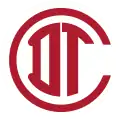
1917–1974 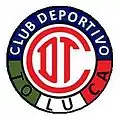 1974–1981
1974–1981
1981–2019 
2017 (centenary)
Honours
Domestic
- Primera División
- Winners (10): 1966–67, 1967–68, 1974–75, Verano 1998, Verano 1999, Verano 2000, Apertura 2002, Apertura 2005, Apertura 2008, Bicentenario 2010
- Segunda División de México
- Winners (1): 1952–53
- Copa México
- Campeón de Campeones
- Winners (4): 1967, 1968, 2003, 2006
Presidents
| Name | From | To |
|---|---|---|
| Román Ferrat Alday | 1917 | 1923 |
| Fernando Barreto | 1923 | 1945 |
| Samuel Martínez García | 1945 | 1953 |
| Luis Gutiérrez Dosal | 1953 | 1959 |
| Enrique Enríquez | 1953 | 1953 |
| Alfonso Faure Lopez | 1969 | 1970 |
| Nemesio Díez Riega | 1953 | 1972 |
| Fernando Corona Álvarez | 1972 | 1977 |
| Germán Sánchez Fabela | 1977 | 1980 |
| Ernesto Nemer Naime | 1980 | 1981 |
| Jesús Fernandez del Cojo | 1981 | 1983 |
| Germán Sánchez Fabela | 1983 | 1984 |
| Jesús Fernández del Cojo | 1984 | 1985 |
| Fernando Corona Álvarez | 1985 | 1986 |
| Germán Sánchez Fabela | 1986 | 1987 |
| Kurt Visetti Vogelbach | 1987 | 1989 |
| Antonio Mañón | 1989 | 1992 |
| José Antonio Roca | 1992 | 1993 |
| Jesús Fernández del Cojo | 1993 | 1995 |
| Sergio Peláez Farell | 1995 | 1997 |
| Rafael Lebrija Guiot | 1997 | 2007 |
| Fernando Corona Álvarez | 2007 | 2010 |
| Santiago Velasco | 2010 | 2011 |
| Fernando Corona Álvarez | 2011 | 2013 |
| Jesús Vallejo | 2013 | 2015 |
| Jaime León | 2015 | 2017 |
| Francisco Suinaga | 2017 |
Managers
|
|
Records
Top goalscorers in a season
|
|
|
|
Appearances
| Position | Player | Period | Games |
|---|---|---|---|
| 1 | 1999–14 | 515 | |
| 2 | 1993–94 1995–96 1998–10 | 419[6] | |
| 3 | 1995–05 | 332 | |
| 4 | 1960–75 | 322 | |
| 5 | 2004–14 | 307 | |
| 6 | 2005–Present | 339 | |
| 7 | 1992–00 2004–06 | 270 | |
| 8 | 2003–09 2013–2017 | 306 | |
| 9 | 1978–85 | 256 | |
| 10 | 2001–07 | 242 |
References
- "Estadio" (in Spanish). Retrieved 10 December 2018.
- "¿Qué tanta afición tiene cada uno de los 18 equipos de la Liga MX?". Récord (in Spanish). Retrieved 10 December 2018.
- "Toluca 5–2 Necaxa Resumen". Mediotiempo.com. 10 May 1998. Retrieved 27 December 2018.
- "El argentino José Pekerman, nuevo técnico del Toluca". Proceso (in Spanish). 31 May 2007. Retrieved 27 December 2018.
- "Deportivo Toluca F.C. – Sitio oficial". Deportivo Toluca.
- Hernán Cristante - Mediotiempo
External links
| Wikimedia Commons has media related to Deportivo Toluca. |
